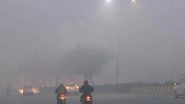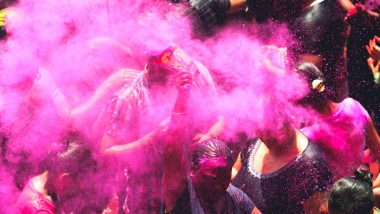Bhubaneswar, February 28: The Odisha government on Monday prohibited the celebration of Holi in public places and also large gatherings during different festivals even as it unlocked all activities in the month of March in the wake of sharp decline in COVID-19 cases across the state.
The Odisha government in its COVID-19 guideline for the month, said that it would remain in force from 5 AM of March 1 to 5 AM of March 31. While night curfew has been withdrawn from February 18, 2022 across the state, it said: "there is a need to unlock all activities". However, COVID-19 appropriate behaviour and protocols are required to be observed scrupulously in order to prevent the transmission of the infection, the order issued by the Chief Secretary said. When is Holi 2022? Know Festival Date Observed 40 Days After Basant Panchami, History and Cultural Significance of 'Festival of Colours'.
In regard to celebration of Mahashivratri, Holi, Dolapurnima, the order said that the local authorities would ensure proper adherence to the COVID-19 appropriate protocols.
"Holi and their related rituals shall not be observed in public places throughout the state. People may celebrate 'Holi' with family members in their houses only and not in any public places including public roads," the order said, adding that during celebration of 'Dola Pumima', people shall ensure Covid Appropriate Behaviour such as physical distancing, use of face mask and hand wash.
During Dola festival, people as per tradition take out procession carrying the idols of Radha and Krishna for worship following which Holi is celebrated.
The government allowed religious rituals, but with strict adherence of COVID-19 protocols, Collectors and Municipal Commissioners may impose appropriate restriction if required in Dola Melan's, it said.
The district authorities will also determine the number of participants in these gatherings with strict adherence to Covid appropriate behaviour and norms. Further mela or congregations outside and within the temple premises may also be reasonably restricted so as to avoid mass gatherings, it said.
Considering local conditions, District Magistrates/Municipal Commissioners may impose appropriate restrictions on entry of devotees into temples and religious places of worship.
Meanwhile, the government in view to normalise and strengthen the economic activities along with protecting the health of the public and preventing spread of Covid-19, the order said: "There shall be graded unlocking throughout the state with effect from 5 AM of 1 March, 2022 till 5 AM of 31 March, 2022."
During the unlock period, all activities are allowed to fully functional with strict adherence to COVID-19 protocols. All social/religious gatherings are allowed with strict adherence to COVID-19 protocols, it said, adding that exhibitions/fairs are allowed with full compliance to COVID protocols.
Referring to the announcement of the election for Urban Local Bodies (ULBs), the state government order said that political gatherings/meetings, for any election to be announced by the appropriate Election Commission shall be allowed as per the instructions/guidelines issued by appropriate Election Commission from time to time with full compliance to COVID protocols.
The government said that marriages, thread ceremony and related gathering with approval from local authorities shall be allowed with a ceiling of 500 persons (for the entire event) including hosts, guests, and catering and other support staff with adherence to COVID-19 safety protocols.
Funerals, last rites and related gatherings allowed with approval from local authorities shall be allowed with a ceiling of 250 persons. It said that under no circumstances, the number of participants shall exceed the ceiling for the entire event.
Marriage processions shall be allowed with due prior written approval from competent authorities subject to the ceiling 100 participants. The order said that any person violating the graded unlocking measures, will be liable to be proceeded against as per the provisions of Disaster Management Act, 2005, and COVID-19 Regulations 2020, besides legal action under IPC, and other legal provisions as applicable.
(The above story is verified and authored by Press Trust of India (PTI) staff. PTI, India’s premier news agency, employs more than 400 journalists and 500 stringers to cover almost every district and small town in India.. The views appearing in the above post do not reflect the opinions of LatestLY)













 Quickly
Quickly


